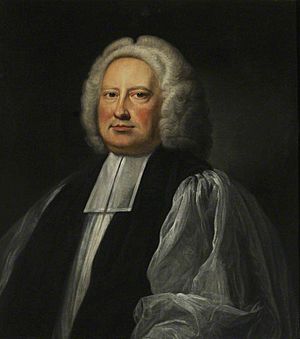John Potter (bishop) facts for kids
Quick facts for kids The Most Reverend and Right Honourable John Potter |
|
|---|---|
| Archbishop of Canterbury | |
 |
|
| Church | Church of England |
| Diocese | Canterbury |
| In Office | 1737–1747 |
| Predecessor | William Wake |
| Successor | Thomas Herring |
| Orders | |
| Consecration | 15 May 1715 by Jonathan Trelawny |
| Personal details | |
| Born | c. 1674 Wakefield, Yorkshire, England |
| Died | 10 October 1747 Lambeth, London, England |
| Buried | Croydon Minster |
| Nationality | English |
| Denomination | Anglican |
| Parents | Thomas Potter |
| Spouse | Elizabeth Venner |
| Previous post | Bishop of Oxford (1715–1737) |
| Alma mater | University College, Oxford |
John Potter (born around 1674, died October 10, 1747) was an important leader in the Church of England. He served as the Archbishop of Canterbury from 1737 to 1747. This is the highest position in the Church of England.
Contents
Early Life and Education
John Potter was born in Wakefield, Yorkshire, England. His father was a linen draper, someone who sold linen cloth. When John was just 14 years old, he started studying at University College, Oxford.
He was a very smart student. In 1693, he published his own notes on ancient Greek writings. The next year, he became a fellow at Lincoln College, Oxford. A fellow is like a senior member or teacher at a college.
Important Books and Studies
In 1697, John Potter published his own version of a book by an ancient Greek writer named Lycophron. He also wrote a famous book called Archaeologia graeca. This book was about the ancient Greek way of life. It was very popular for many years.
Church Career
John Potter's career in the church grew steadily. In 1704, he became a chaplain to Thomas Tenison, who was then the Archbishop of Canterbury. A chaplain is a minister who serves in a special role, often for an important person. Soon after, he became a chaplain to Queen Anne herself.
From 1708, he held a special teaching position at Oxford called Regius Professor of Divinity. He also became a canon at Christ Church Cathedral, Oxford. In 1709, he married Elizabeth Venner.
Becoming a Bishop
In 1715, John Potter became the Bishop of Oxford. A bishop is a senior leader in the church who oversees a specific area called a diocese. In the same year, he published another important book about Clement of Alexandria, an early Christian writer.
He also wrote a book called Discourse on Church Government in 1707. He was involved in a big discussion with another bishop, Benjamin Hoadly, about how the church should be run. Even though Potter was a Whig (a political group), he believed in a "High Church" approach, which meant he thought church traditions and authority were very important.
A notable event in his career was when he ordained John Wesley as a deacon in 1725. He later ordained Wesley as a priest in 1728. John Wesley later became a very famous leader who started the Methodist movement.
Archbishop of Canterbury
In January 1737, John Potter was chosen to be the Archbishop of Canterbury. This was a big surprise to many people. As Archbishop, he continued to support his "High Church" views. He tried to bring back the Convocation, which was a kind of church parliament, but he wasn't successful.
The famous writer Alexander Pope even wrote about him in his poem The Dunciad in 1743.
Later Life and Legacy
John Potter passed away on October 10, 1747. His collected writings, including his sermons and lectures, were published in three volumes after his death. These works showed his deep knowledge of theology.
He was buried in Croydon Minster in Surrey.
 | Emma Amos |
 | Edward Mitchell Bannister |
 | Larry D. Alexander |
 | Ernie Barnes |

